Module 4 Healthy food Unit 3 Language in use.课件
文档属性
| 名称 | Module 4 Healthy food Unit 3 Language in use.课件 | 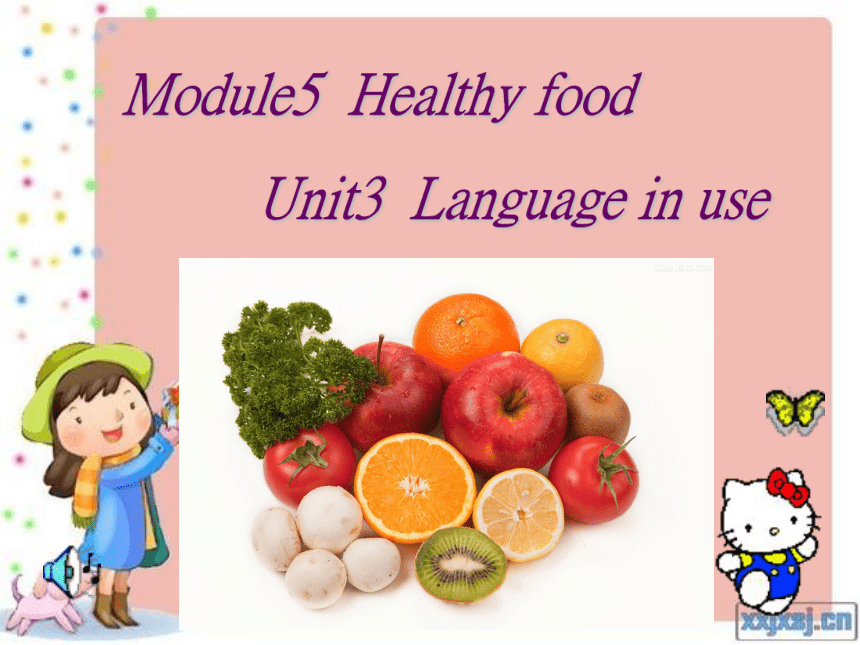 | |
| 格式 | zip | ||
| 文件大小 | 3.3MB | ||
| 资源类型 | 教案 | ||
| 版本资源 | 外研版 | ||
| 科目 | 英语 | ||
| 更新时间 | 2014-05-03 15:02:25 | ||
图片预览

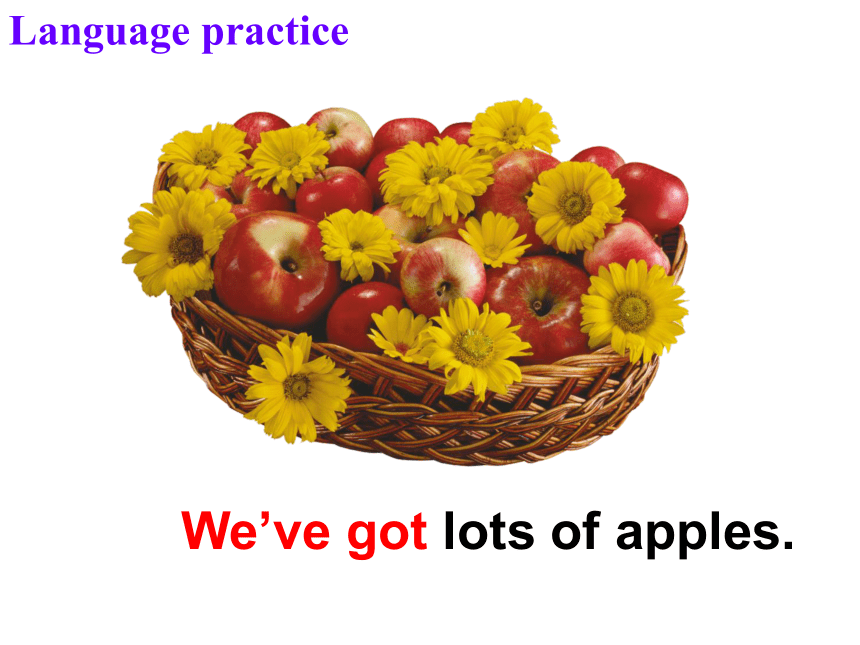
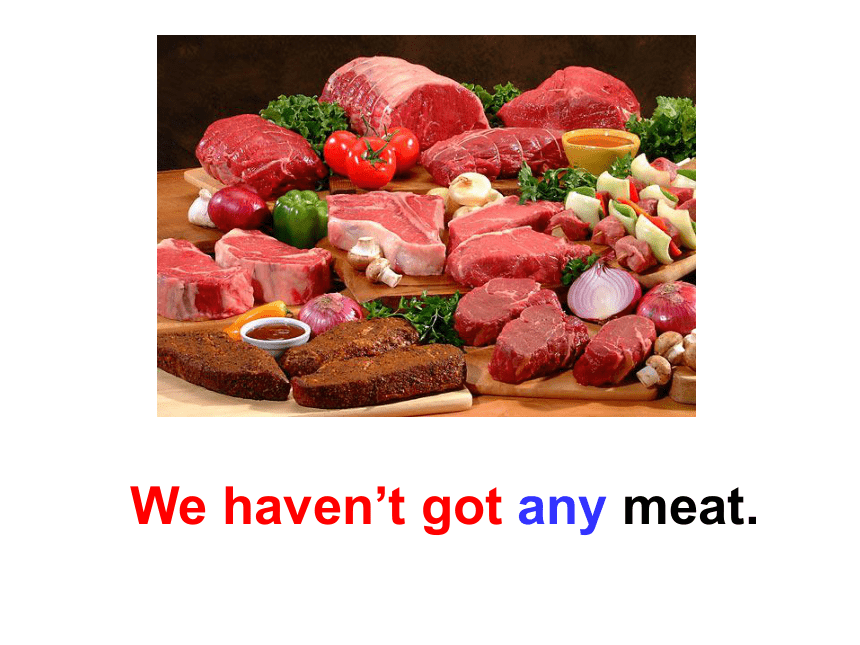
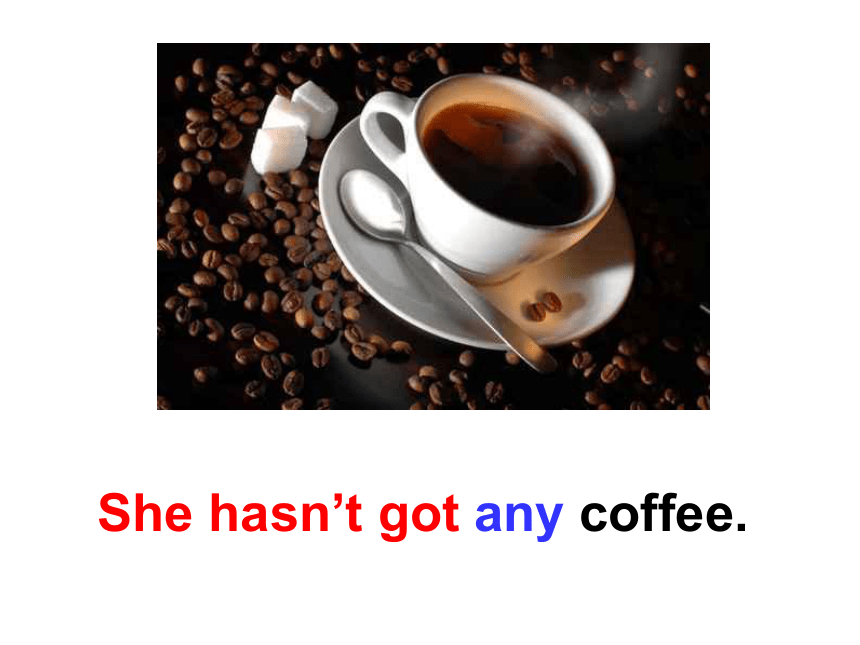
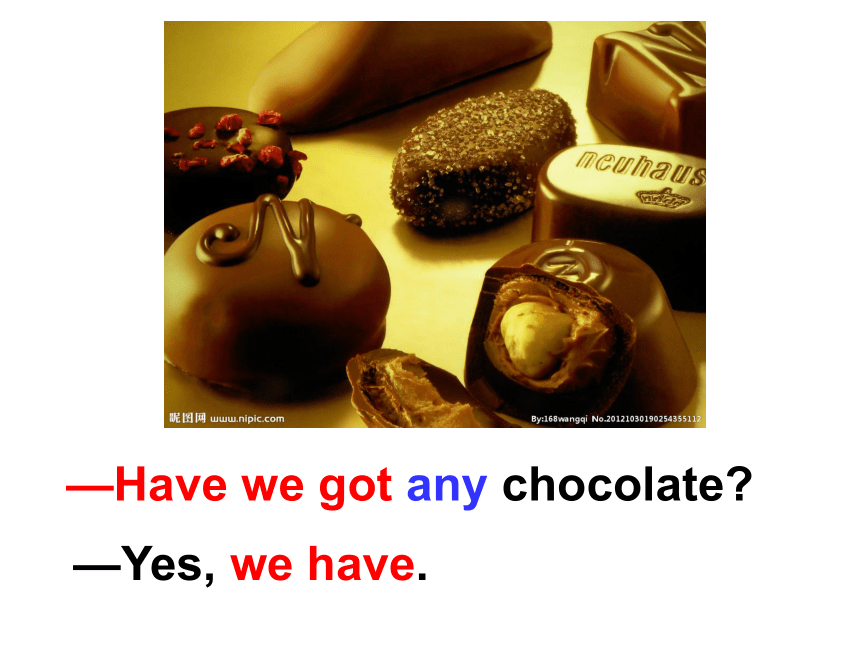
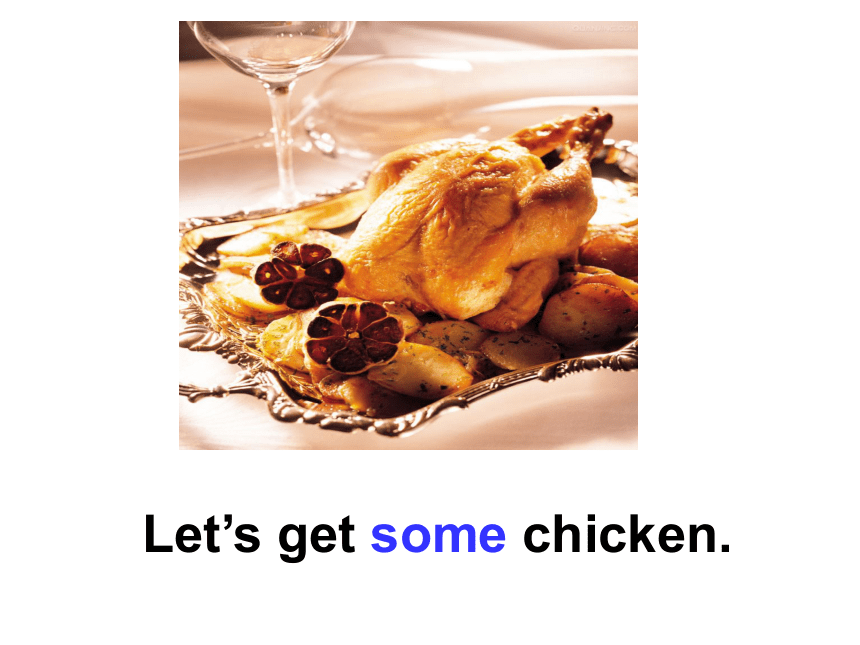
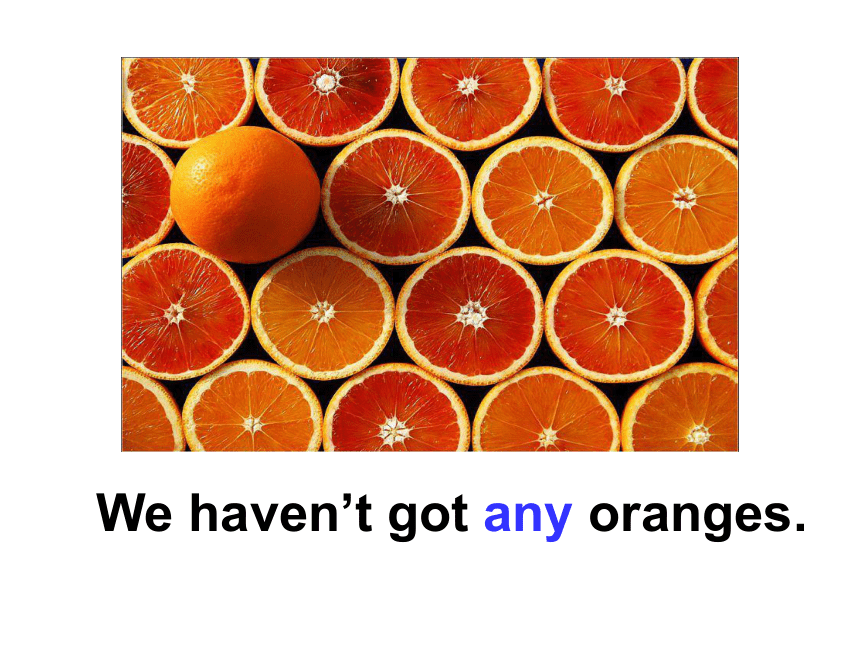
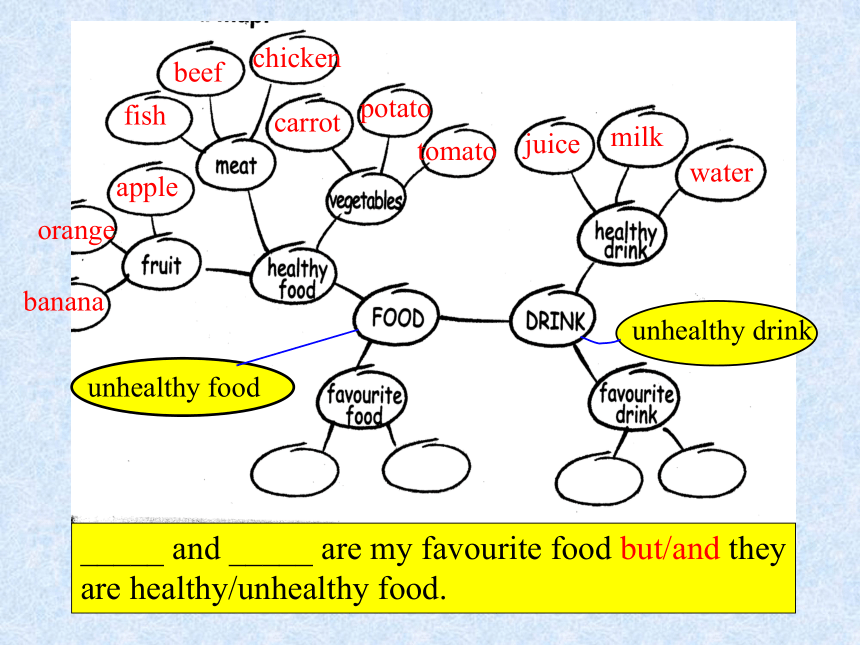
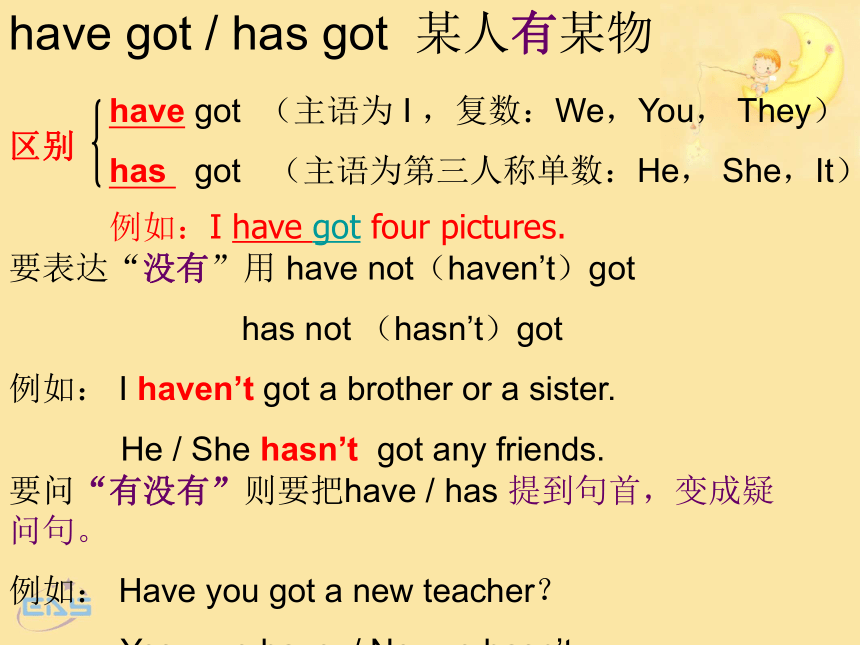
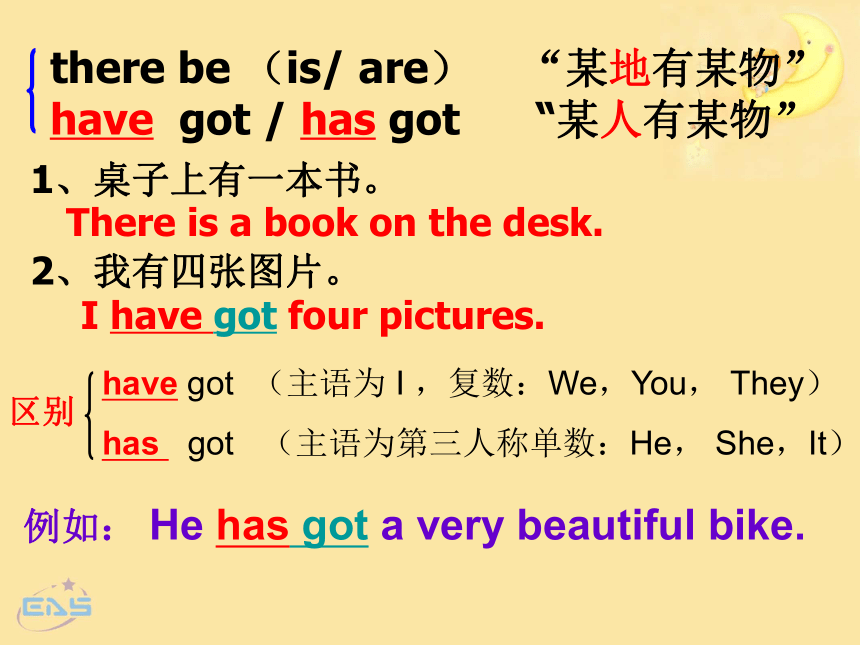

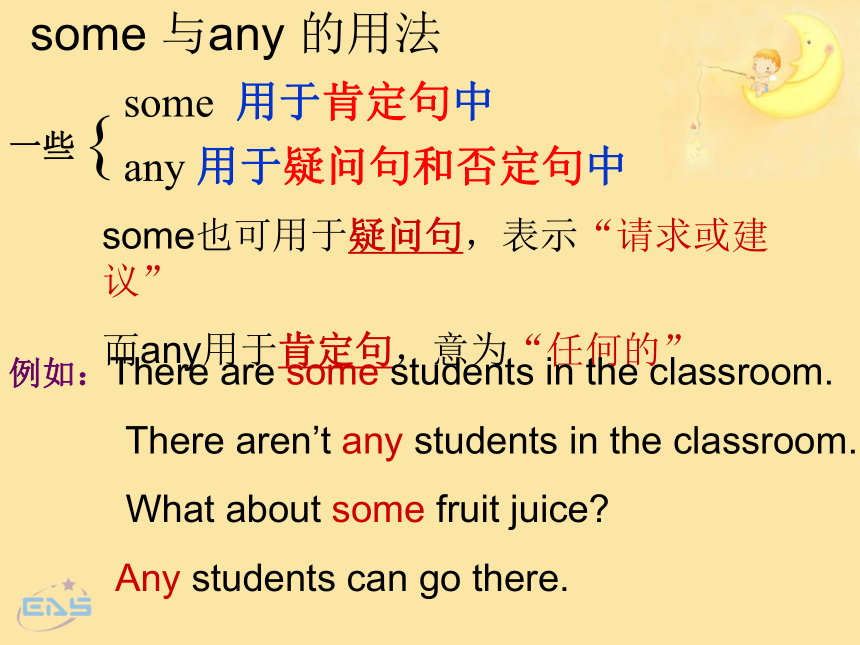
文档简介
课件33张PPT。Module5 Healthy food
Unit3 Language in useLanguage practiceWe’ve got lots of apples.We haven’t got any meat.She hasn’t got any coffee.—Have we got any chocolate?—Yes, we have.Let’s get some chicken.We haven’t got any oranges.unhealthy foodappleorangebananafishbeefchickencarrotpotatotomatojuicemilkwaterunhealthy foodunhealthy drink_____ and _____ are my favourite food but/and they are healthy/unhealthy food. have got (主语为 I ,复数:We,You, They)
has got (主语为第三人称单数:He, She,It)区别have got / has got 某人有某物要表达“没有”用 have not(haven’t)got
has not (hasn’t)got
例如: I haven’t got a brother or a sister.
He / She hasn’t got any friends.要问“有没有”则要把have / has 提到句首,变成疑问句。
例如: Have you got a new teacher?
Yes,we have. / No, we hasn’t.
例如:I have got four pictures.1、桌子上有一本书。
2、我有四张图片。
there be (is/ are) “某地有某物”
have got / has got “某人有某物” There is a book on the desk. I have got four pictures.have got (主语为 I ,复数:We,You, They)
has got (主语为第三人称单数:He, She,It)区别例如: He has got a very beautiful bike.1. __ _____ any bread in the box?
2. She ___ ____ a beautiful bike.
3. Under the tree _____ ___ some
women drinking tea.
4. ___ _____ any books in your bag?
5. _____ you ____ a white coat?Is therehas gotthere areAre thereHave got用 there be / have (has) got / has (have) 的正确形式填空。一些{some 用于肯定句中any 用于疑问句和否定句中some 与any 的用法some也可用于疑问句,表示“请求或建议”
而any用于肯定句,意为“任何的”例如:There are some students in the classroom.
There aren’t any students in the classroom.
What about some fruit juice?
Any students can go there.
Fill in the blanks with “some” or “any”
1、She hasn’t got ____ tomatoes.
2、Have you got ____ pork?
3、There isn’t ____ milk in the bottle.
4、Would you like ____ apples?
5、They have got ____ beef.anyanyanysomesomeLook at the picture and talk about the food
in the fridge.- Have we got any…?
Yes, we have. /
No, we haven’t.1.We_______________meat in the fridge.
2.We _______________fish in the fridge.
3.We _______________vegetables in the fridge.
4.We ______________eggs in the fridge.
5.We ______________bananas in the fridge.
6.We______________apples in the fridge.
7.We______________orange juice in the fridge.
8.We_______________milk in the fridge.Now write about the food in the fridgehave got some haven’t got anyhave got somehave got somehave got somehaven’t got anyhave got somehaven’t got any 名词是表示人、事物、地点或抽象概念的名称的词,可以用数量来计算的名词为可数名词。
可数名词一般有单数或复数两种形式。可数名词的复数形式变化如下:可数名词单复数① 一般在名词词尾加-s. 如:desks, pens.
② 以s, x, ch, sh结尾的名词的词尾加-es.
如:watches, buses, boxes.
③ 以“辅音字母+y”结尾的名词改y为i再
加es. 如:families, cities.
④ 以f或fe结尾的名词改f或fe为v再加es.
如:lives, knives.
⑤ 以“辅音字母+o”结尾的有生命的名词
在词尾加es. 如:tomatoes, potatoes
无生命的名词+s. 如:pianos, radios可数名词单复数口诀一般情况下直接加s
以e结尾的只要加s
以s,x,ch,sh结尾的单词 加es
以辅音字母+y结尾的变y 为i 加es
以o结尾的加s,只有几个特殊: 黑人(Negro)、英雄(hero)、(爱吃)马铃薯(potato) 和西红柿(tomato)这四个单词加es
以f 或fe结尾的单词,去f或fe 变v 加es写出下列名词的复数形式
1. apple – apples 2. orange – oranges
3. potato – potatoes 4. carrot – carrots
5. banana – bananas 6. egg – eggs
7. hamburger – hamburgers
8. noodle – noodles
9. vegetable – vegetables
10. tomato – tomatoes有些名词的复数变化是不规则的。
child---children woman---women
man---men foot---feet
tooth---teeth Japanese---Japanese
Chinese---Chinese sheep---sheep不可数名词一般无法用数量来计算的名词为不可数名词。
不可数名词前面不能用表示具体数量的数词
或不定冠词a, an。
常见的用于不可数名词前的词或短语有
some, any, much, little, a little等。
不可数名词:
1. fish 2. meat
3. rice 4. milk
5. beef 6. chicken
7. juice 8. pork
9. water1. We haven’t got any _______ (桔子).
2. Eating more __________ (蔬菜) is
good for your health.
3. How many ________ (西红柿) have
you got?
4. My favourite meat is ____ (鱼肉).根据括号内的汉语提示完成句子。orangesvegetablestomatoesfish---Have/has… got any…?
---Yes, …have/has got some….
/ No, … haven’t/ hasn’t got any….重点句型:完成句子:
1. A: Tony has got some bread. _____he ___ ___milk?
B: No, he _____ ___ ___.Can you give him some?
2. A: Lucy, _____ we _____ _____ apples?
B: Yes,we _____ _____ _____. Do you want one?
3. A: Betty, Lucy and Tony are over there. _____ they _____ ____ tea?
B: No, they ______ _____ _____. Can you give them some, please? Has got any hasn’t got anyhave got any have got someHavehaven’t got anygot any4. A: Where is Betty? _____ she _____ _____ potatoes? She likes them very much.
B: Yes, she _____ _____ _____.
5. A: Tony, _____ you _____ _____ fish?
B: No, I ________ _____ _____ . I don’t like fish.
Has got any has got some Have got anyhaven’t got any4. Complete the sentences with the correct
form of the words from the box.bitdeliciousimportantrememberstay1. ___________ to buy some fruit.2. It’s ____________ to eat healthy food.3. Eat well and ___________ healthy.4. Orange juice is ___________. Let’s buy some.5. I am a _________ tired.Remember importantstaydeliciousbitActivity 4 语言点1. remember to do 记得要做某事
反义短语:forget to do 忘记要做某事
2. It’s + adj. + to do sth. “做…..是怎样的”
3. 祈使句,动词原形开头,没有主语表示向说话的人命令,或发出请求。
4. Let’s = Let us 后加动词原形
5. a bit 有点儿,稍微
Around the worldA Western breakfast
In the West, for breakfast, people usually eat bread and eggs and drink coffee or tea, milk and fruit juice.找出下表中的食物名词和饮料名词“have+表示一日三餐的名词”,意为“用餐”。
have breakfast/lunch/supper
吃早饭/午饭/晚饭。
have, has 其他用法have+表示食品、饮料等名词”,意为“吃;喝”。如:
have (some) bread 吃面包,
have eggs (for breakfast) (早餐)吃鸡蛋
have coffee 喝咖啡。 “have+表示动作的名词” have a rest 休息一下
have a swim 游泳
have a drink 喝一点
have a look (at ...) (朝……)看一眼 “have+表示某种活动的名词”,意为“进行,举行” have a class (学生) 上课
have a birthday party 举行生日聚会
Unit3 Language in useLanguage practiceWe’ve got lots of apples.We haven’t got any meat.She hasn’t got any coffee.—Have we got any chocolate?—Yes, we have.Let’s get some chicken.We haven’t got any oranges.unhealthy foodappleorangebananafishbeefchickencarrotpotatotomatojuicemilkwaterunhealthy foodunhealthy drink_____ and _____ are my favourite food but/and they are healthy/unhealthy food. have got (主语为 I ,复数:We,You, They)
has got (主语为第三人称单数:He, She,It)区别have got / has got 某人有某物要表达“没有”用 have not(haven’t)got
has not (hasn’t)got
例如: I haven’t got a brother or a sister.
He / She hasn’t got any friends.要问“有没有”则要把have / has 提到句首,变成疑问句。
例如: Have you got a new teacher?
Yes,we have. / No, we hasn’t.
例如:I have got four pictures.1、桌子上有一本书。
2、我有四张图片。
there be (is/ are) “某地有某物”
have got / has got “某人有某物” There is a book on the desk. I have got four pictures.have got (主语为 I ,复数:We,You, They)
has got (主语为第三人称单数:He, She,It)区别例如: He has got a very beautiful bike.1. __ _____ any bread in the box?
2. She ___ ____ a beautiful bike.
3. Under the tree _____ ___ some
women drinking tea.
4. ___ _____ any books in your bag?
5. _____ you ____ a white coat?Is therehas gotthere areAre thereHave got用 there be / have (has) got / has (have) 的正确形式填空。一些{some 用于肯定句中any 用于疑问句和否定句中some 与any 的用法some也可用于疑问句,表示“请求或建议”
而any用于肯定句,意为“任何的”例如:There are some students in the classroom.
There aren’t any students in the classroom.
What about some fruit juice?
Any students can go there.
Fill in the blanks with “some” or “any”
1、She hasn’t got ____ tomatoes.
2、Have you got ____ pork?
3、There isn’t ____ milk in the bottle.
4、Would you like ____ apples?
5、They have got ____ beef.anyanyanysomesomeLook at the picture and talk about the food
in the fridge.- Have we got any…?
Yes, we have. /
No, we haven’t.1.We_______________meat in the fridge.
2.We _______________fish in the fridge.
3.We _______________vegetables in the fridge.
4.We ______________eggs in the fridge.
5.We ______________bananas in the fridge.
6.We______________apples in the fridge.
7.We______________orange juice in the fridge.
8.We_______________milk in the fridge.Now write about the food in the fridgehave got some haven’t got anyhave got somehave got somehave got somehaven’t got anyhave got somehaven’t got any 名词是表示人、事物、地点或抽象概念的名称的词,可以用数量来计算的名词为可数名词。
可数名词一般有单数或复数两种形式。可数名词的复数形式变化如下:可数名词单复数① 一般在名词词尾加-s. 如:desks, pens.
② 以s, x, ch, sh结尾的名词的词尾加-es.
如:watches, buses, boxes.
③ 以“辅音字母+y”结尾的名词改y为i再
加es. 如:families, cities.
④ 以f或fe结尾的名词改f或fe为v再加es.
如:lives, knives.
⑤ 以“辅音字母+o”结尾的有生命的名词
在词尾加es. 如:tomatoes, potatoes
无生命的名词+s. 如:pianos, radios可数名词单复数口诀一般情况下直接加s
以e结尾的只要加s
以s,x,ch,sh结尾的单词 加es
以辅音字母+y结尾的变y 为i 加es
以o结尾的加s,只有几个特殊: 黑人(Negro)、英雄(hero)、(爱吃)马铃薯(potato) 和西红柿(tomato)这四个单词加es
以f 或fe结尾的单词,去f或fe 变v 加es写出下列名词的复数形式
1. apple – apples 2. orange – oranges
3. potato – potatoes 4. carrot – carrots
5. banana – bananas 6. egg – eggs
7. hamburger – hamburgers
8. noodle – noodles
9. vegetable – vegetables
10. tomato – tomatoes有些名词的复数变化是不规则的。
child---children woman---women
man---men foot---feet
tooth---teeth Japanese---Japanese
Chinese---Chinese sheep---sheep不可数名词一般无法用数量来计算的名词为不可数名词。
不可数名词前面不能用表示具体数量的数词
或不定冠词a, an。
常见的用于不可数名词前的词或短语有
some, any, much, little, a little等。
不可数名词:
1. fish 2. meat
3. rice 4. milk
5. beef 6. chicken
7. juice 8. pork
9. water1. We haven’t got any _______ (桔子).
2. Eating more __________ (蔬菜) is
good for your health.
3. How many ________ (西红柿) have
you got?
4. My favourite meat is ____ (鱼肉).根据括号内的汉语提示完成句子。orangesvegetablestomatoesfish---Have/has… got any…?
---Yes, …have/has got some….
/ No, … haven’t/ hasn’t got any….重点句型:完成句子:
1. A: Tony has got some bread. _____he ___ ___milk?
B: No, he _____ ___ ___.Can you give him some?
2. A: Lucy, _____ we _____ _____ apples?
B: Yes,we _____ _____ _____. Do you want one?
3. A: Betty, Lucy and Tony are over there. _____ they _____ ____ tea?
B: No, they ______ _____ _____. Can you give them some, please? Has got any hasn’t got anyhave got any have got someHavehaven’t got anygot any4. A: Where is Betty? _____ she _____ _____ potatoes? She likes them very much.
B: Yes, she _____ _____ _____.
5. A: Tony, _____ you _____ _____ fish?
B: No, I ________ _____ _____ . I don’t like fish.
Has got any has got some Have got anyhaven’t got any4. Complete the sentences with the correct
form of the words from the box.bitdeliciousimportantrememberstay1. ___________ to buy some fruit.2. It’s ____________ to eat healthy food.3. Eat well and ___________ healthy.4. Orange juice is ___________. Let’s buy some.5. I am a _________ tired.Remember importantstaydeliciousbitActivity 4 语言点1. remember to do 记得要做某事
反义短语:forget to do 忘记要做某事
2. It’s + adj. + to do sth. “做…..是怎样的”
3. 祈使句,动词原形开头,没有主语表示向说话的人命令,或发出请求。
4. Let’s = Let us 后加动词原形
5. a bit 有点儿,稍微
Around the worldA Western breakfast
In the West, for breakfast, people usually eat bread and eggs and drink coffee or tea, milk and fruit juice.找出下表中的食物名词和饮料名词“have+表示一日三餐的名词”,意为“用餐”。
have breakfast/lunch/supper
吃早饭/午饭/晚饭。
have, has 其他用法have+表示食品、饮料等名词”,意为“吃;喝”。如:
have (some) bread 吃面包,
have eggs (for breakfast) (早餐)吃鸡蛋
have coffee 喝咖啡。 “have+表示动作的名词” have a rest 休息一下
have a swim 游泳
have a drink 喝一点
have a look (at ...) (朝……)看一眼 “have+表示某种活动的名词”,意为“进行,举行” have a class (学生) 上课
have a birthday party 举行生日聚会
同课章节目录
- Starte
- Module 1 My teacher and my friends
- Module 2 My English lesson
- Module 3 My English book
- Module 4 My everyday life
- Module 1 My classmates
- Unit 1 Nice to meet you.
- Unit 2 I'm Wang Lingling and I'm thirteen years ol
- Unit 3 Language in use.
- Module 2 My family
- Unit 1 Is this your mum?
- Unit 2 These are my parents.
- Unit 3 Language in use.
- Module 3 My school
- Unit 1 There are thirty students in my class.
- Unit 2 The library is on the left of the playgroun
- Unit 3 Language in use.
- Module 4 Healthy food
- Unit 1 We've got lots of apples.
- Unit 2 Is your food and drink healthy?
- Unit 3 Language in use.
- Module 5 My school day
- Unit 1 I love history.
- Unit 2 We start work at nine o'clock.
- Unit 3 Language in use.
- Revision module A
- Module 6 A trip to the zoo
- Unit 1 Does it eat meat?
- Unit 2 The tiger lives in Asia.
- Unit 3 Language in use.
- Module 7 Computers
- Unit 1 How do I write my homework on the computer?
- Unit 2 When do you use a computer?
- Unit 3 Language in use.
- Module 8 Choosing presents
- Unit 1 I always like birthday parties.
- Unit 2 She often goes to concerts.
- Unit 3 Language in use.
- Module 9 People and places
- Unit 1 We're enjoying the school trip a lot.
- Unit 2 They're waiting for buses or trains.
- Unit 3 Language in use.
- Module 10 Spring Festival
- Unit 1 Are you getting ready for Spring Festival?
- Unit 2 My mother's cleaning our houses and sweepin
- Unit 3 Language in use.
- Revision module B
